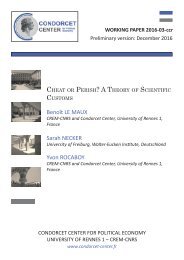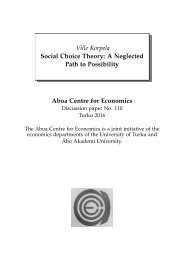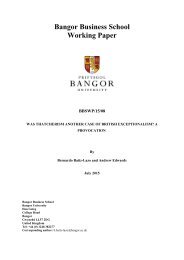MEMORANDUM
n?u=RePEc:hhs:osloec:2016_018&r=hpe
n?u=RePEc:hhs:osloec:2016_018&r=hpe
Create successful ePaper yourself
Turn your PDF publications into a flip-book with our unique Google optimized e-Paper software.
Leontief. He wrote to Irving Fisher to express his interest in becoming a member and<br />
convey his regrets that he was unable to attend. Leontief noted that Ezekiel was also<br />
invited and unable to attend.<br />
At the end of 1930 economic prospects had changed also in USA, including for the<br />
institutions Leontief had applied to. He never got any response from the Giannini<br />
Foundation. Ayres responded that their research work was more likely to contract than<br />
expand; no further commitments could be made. Ayres at Cleveland Trust went out of his<br />
way, however, to offer constructive advice, explaining that owing to the severe business<br />
depression the USA was experiencing a considerable number of industrial and financial<br />
institutions had been releasing research workers of unquestioned ability: “Their difficulty<br />
in making new connections leads me to believe that you would find your efforts more<br />
fruitful if they were directed toward making a connection with some of what he called the<br />
“subsidized” research institutions in this country.” 135 Ayres pointed particularly to NBER<br />
and Brooking Institution but mentioned also the Bureau of Agricultural Economics of the<br />
US Department of Agriculture and the Federal Farm Board. The prices with which the<br />
latter two were concerned were naturally agricultural prices. He passed on to Leontief also<br />
that there had been a recent reorganization in the Department of Commerce which<br />
contemplated more thoroughgoing analyses of industrial commodity prices, although Ayres<br />
didn’t really know much about it. In Ayres’ view expressed his belief that Leontief’s best<br />
opportunity lay with the subsidized institutions he had mentioned.<br />
Both Brookings Institution and NBER were well endowed institutions, both<br />
benefitting from Rockefeller Foundation grants in addition to other funds. And Ayres was<br />
right, they had something to offer. Nourse of Brookings Institutions responded to Leontief<br />
that, “it would be a cause of great gratification to me if we could be the means of<br />
facilitating your spending some time in research work in the United States.” 136<br />
Nourse offered two options. One was a regular staff appointment at the Institute of<br />
Economics, directed by Nourse; the other a fellowship under the Training Division.<br />
Fellowships were granted for an academic year of nine months, offered complete freedom<br />
to pursue whatever line of work the applicant was most interested in, and came with a<br />
small stipend “just about sufficient to defray your expenses”. For a staff appointment the<br />
key issue was the project, as it had to fit into the research program of the Institute of<br />
Economics. Nourse thus invited more information from Leontief as to what he was<br />
interested in, including the range of salary he would consider appropriate in connection<br />
with a staff appointment. The fellowship stipend was small but better than nothing. It<br />
would provide a chance to visit USA, get acquainted with institutions and people. Leontief<br />
decided to apply for the fellowship and pursue possibilities at NBER as well.<br />
135 Ayres to Leontief, 2 December 1930.<br />
136 Nourse to Leontief, 28 November 1930.<br />
55





